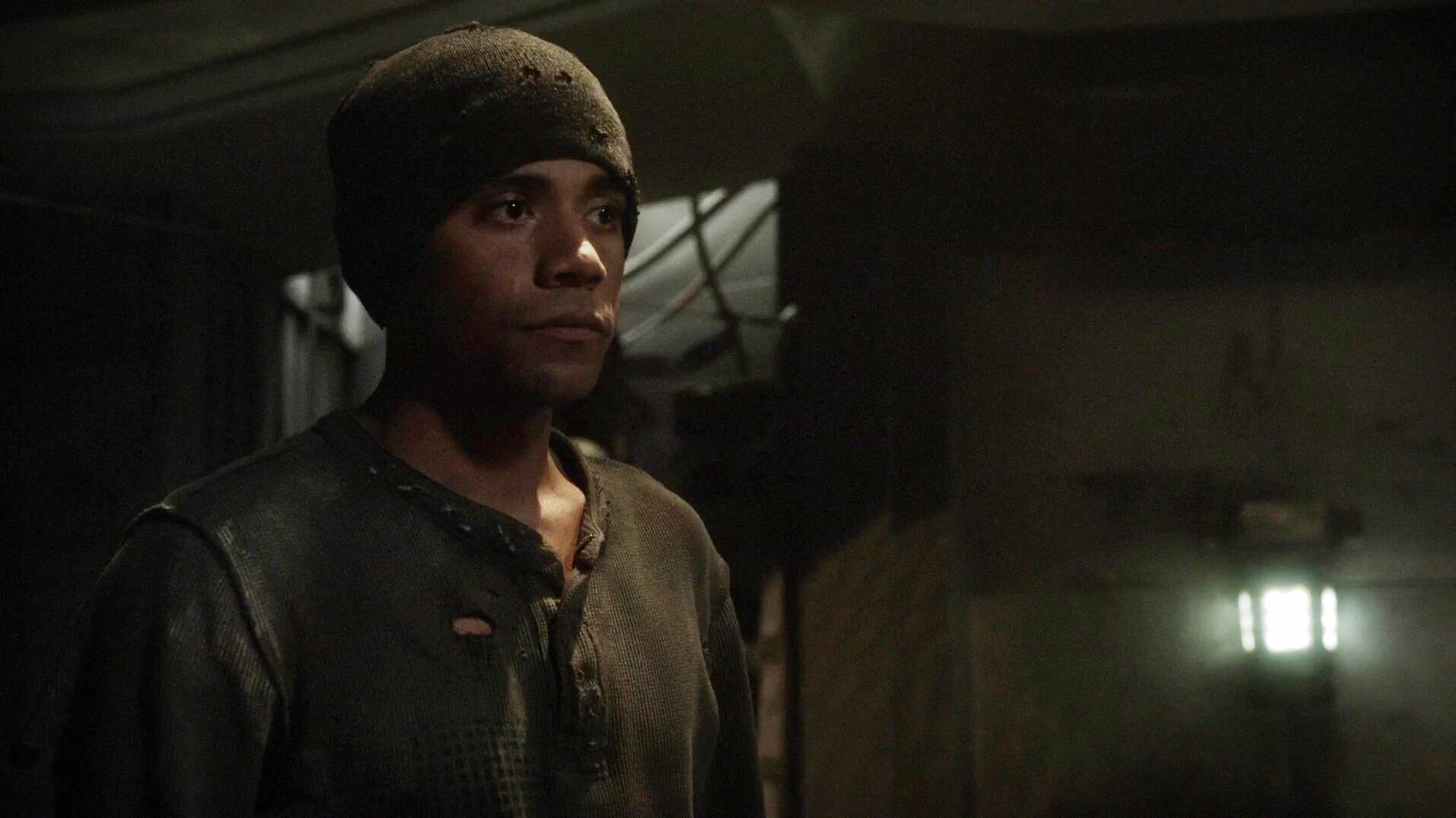
When critics and fans write about LGBT representation on The 100, the focus always seems to be on Clarke Griffin. As a bisexual female lead who has canonical romances with men and women, that focus makes sense. However, in focusing solely on Clarke, discussion completely misses one incredibly important LGBT character: Nathan Miller.
The 100 has myriad issues with representation, particularly when it comes to race. The settler colonialist narrative of the series is messy at best and the writers seem to have a particular fascination with killing off characters of color. Worse still, those deaths serve to elevate the pain, suffering, and status of primarily white women, which further drives home the point that we need more diverse writers, directors, and creators working behind the scenes on shows that deal with these subjects.

At any rate, the careful growth of Nathan Miller is possibly the one thing that this series actually handles well. Played by Jarod Joseph, Nathan Miller (known mostly by his last name) is a black, presumably gay man who is sent to Earth with the hundred delinquents in season one. Miller was locked up in the Sky Box for theft, which seems simple until his class background is later explored with the introduction of his father in season two.
In a series of characters who can often be one-dimensional, Miller’s development is more intersectional and therefore, more compelling. The show explores several aspects of who he is and gives him the room to be messy and complicated, just like a real person.
Initially, Miller is presented as a background character. He’s one of Bellamy’s “whatever the hell we want” militia members, acting as Bellamy’s second in command. Throughout season one, Miller is primarily written as a racially stereotyped thug. His initial crime, combined with his willingness to force the delinquents to shed their wristbands, as well as his determination to keep Octavia away from Lincoln (at Bellamy’s request), all paint him in a particularly unflattering light.
It’s not until season two that we learn more about him and his past. We learn through dialogue, when Miller is trapped inside Mt. Weather and working with Jasper, Monty, Harper, and Maya to free themselves and their friends, that Miller has a boyfriend back on the Ark. The revelation seems shocking, because at this point the audience has been conditioned to assume that Miller is just another stereotype.
By giving him a boyfriend, even if that boyfriend likely died when the Ark crashed, the writers give Miller significantly more depth. It’s very rare that we see LGBT people of color in fiction, but especially black men. Black masculinity so vehemently stigmatizes homosexuality that many black men feel unsafe ever “coming out”. Thus, good representation of black, LGBT men in popular media is incredibly important.
In season three, Miller (and the audience) find out that his boyfriend, in fact, survived the Ark literally crashing onto Earth. Throughout seasons three and four, we see Miller and Bryan actually together, until ideological differences in the midst of another nuclear apocalypse cause them to break up.
The relationship between Miller and Bryan is really interesting. Their individual experiences with the grounders push them to opposite sides of the fight headed by Pike in season three, wherein Bryan acts as a foil for Bellamy. (Bryan, a white man, isn’t villainized for the decisions he makes despite them being nearly identical to the decisions made by Bellamy, a mixed race man. That is infuriating, but it’s a subject for another 100 Thoughts.)
However, even with the issues in Bryan’s development, his presence offers Miller the chance for significant character growth. Miller’s scenes with Bryan include on-screen kisses, intimate touches, and emotionally vulnerable moments. Opting to keep Bryan alive and bring him back together with Miller was a great move by The 100 writers. Not only do we get to see Miller talk about his boyfriend, we get to see him with his boyfriend. Although the relationship eventually dissolves, that’s amazing.
Furthermore, Miller learns that even though he loves Bryan, that isn’t always enough. Both characters are determined to survive on Earth, but survival means something different for both of them. This difference is emphasized by Miller’s relationship with the hundred, especially Bellamy, and by Miller’s relationship with his father.
David Miller was the captain of the guard on the Ark and takes up a similar role on Earth after he comes down with the ship in season two. He was not only complicit in locking up his son for theft, but also in sending Miller and the other delinquents to the ground.
As the son of a guard, Miller would have grown up on Alpha Station, meaning he had more access to things on the Ark than many of the other delinquents. He likely had more privileges than Bryan, who grew up on Farm Station. The fact that Miller aligns himself with Bellamy, who grew up poor, is interesting. Though Bellamy was briefly a cadet before his sister was discovered and he was demoted to the role of janitor, it’s safe to assume that he and Miller never interacted on the Ark.
Since The 100 creator Jason Rothenberg insists that “labels don’t matter” in-verse, Miller’s sexuality isn’t ever explored as an issue with his father. But his reasons for committing theft are never fully explored, and presumably, as a child of privilege, he wouldn’t have needed to steal to survive. Besides which, his crime must have been difficult for David to come to grips with. The captain of the guard’s son being sent to the Sky Box? How uncomfortable.

By the end of season four, when Skaicru has to choose 100 of its people to stay in the bunker and send the rest out to die in the coming death wave, Miller is separated from his father. Their roles are reversed: when Miller was sent to the ground, he was considered expendable because of his crime. When David is removed from the bunker, he is considered expendable because of his age. If Skaicru intends to survive, they need to keep the majority of their young, healthy people alive to increase the chances of repopulation.
However, given that Miller is gay, he likely won’t participate in repopulation efforts. His role in their society will be different. Following his breakup with Bryan at the beginning of season four, we never see Bryan again, so there’s no hint as to whether he is in the bunker, on the ground, or elsewhere. But after six years underground, it will be interesting to see how Miller has evolved.
Did he fall in love again? Did his father’s death have an especially profound effect on him? He told his dad that if both of their names weren’t called in the bunker raffle that he would leave the bunker with him. Then Kane and Jaha gassed everyone, made decisions about who lived or died, and took that decision out of Miller’s hands.
Nathan Miller is a compelling and complex character with layers of depth, including familial ties, sexuality, criminal history and eagerness to survive. Jarod Joseph plays the character with equal complexity. His continued and growing presence on The 100 is a solid reason to keep watching in spite of the series’ issues — for a character that began as nothing more than a background role, Miller’s story has been fleshed out in so many ways. This development has given him a real, tangible presence on the series that makes him inexpendable to the overall arc.
Nathan Miller matters. Hopefully, his story will continue to be fleshed out in new, interesting, and intersectional ways in season five. It would be particularly compelling to dive into his reasons for committing theft on the Ark, and whether or not those same elements came into play at any point in the bunker.



![[REVIEW] BETSY BRADDOCK: CAPTAIN BRITAIN #1](https://geekd-out.com/wp-content/uploads/2023/02/bb-cb-1-feat-150x150.jpeg)